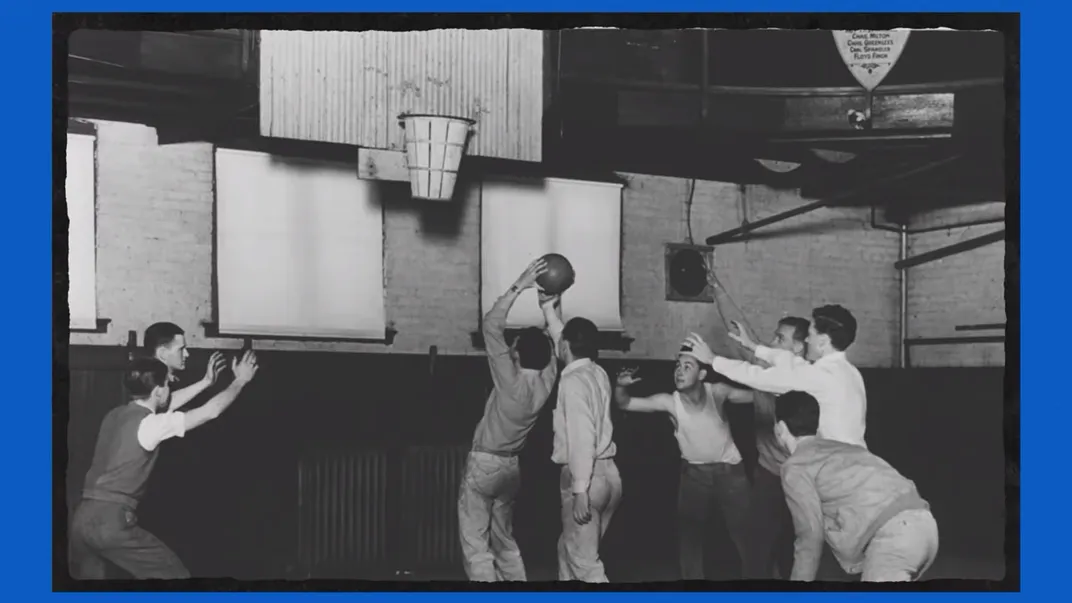How a College Gym Teacher in Massachusetts Invented a New Sport to Keep His Students Entertained and Fit During the Frigid Winter
From a humble first game with peach baskets and a soccer ball on this day in 1891, basketball evolved quickly into one of the world’s most popular sports
:focal(982x359:983x360)/https://tf-cmsv2-smithsonianmag-media.s3.amazonaws.com/filer_public/b6/ca/b6cacf46-43e6-4f6e-b9a6-bd384ecf35b5/dr_james_naismith.jpg)
It was the winter of 1891 in Springfield, Massachusetts. At the International YMCA Training School, now known as Springfield College, football season had ended, baseball season had yet to begin, and indoor sports were limited to marching, calisthenics and some gymnastics.
The young men in James Naismith’s class were restless until, at the request of school superintendent Luther H. Gulick, Naismith invented a new game for his students. He called it “basket ball” and introduced the game on December 21.
Naismith was a 30-year-old graduate student and physical education teacher from Almonte, a mill town in Ontario, Canada. At first, when tasked with his superintendent’s request for a good indoor sport, he attempted to modify existing games like football and soccer to no avail.
As Naismith wrote in his posthumously published 1941 book, Basketball: Its Origin and Development, “I began to study games from the philosophical side,” analyzing the common elements of popular sports.
/https://tf-cmsv2-smithsonianmag-media.s3.amazonaws.com/filer_public/36/9c/369c170d-5e3f-435e-87c7-c1572471f21e/dr_james_naismiths_original_13_rules_of_basket_ball_pg_1.jpg)
A good game, he reasoned, had to be easily learned. Games with small balls—baseball, tennis, cricket, lacrosse—required additional equipment, like a stick, bat or racquet, that took time to master. Sports that used big balls, like rugby and football, were more easily learned, but tackling would not work indoors. So players of this new sport, Naismith concluded, should not run with the ball.
Drawing inspiration from childhood memories of a game called Duck on a Rock—in which one team of kids tossed rocks to try and knock the other team’s “duck” (a separate rock) off a larger rock—Naismith concluded that the ball should be thrown in an arc into a horizontal goal, so as not to encourage “roughness.”
With a soccer ball and two peach baskets he borrowed from the gym’s building manager, Naismith set up a court and tacked a preliminary set of rules on the bulletin board.
Some of Naismith’s original rules of the game remain today. Rule 1: “The ball may be thrown in any direction with one or both hands.” Rule 3: “A player cannot run with the ball.” Rule 13: “The side making the most goals … shall be declared the winner.”
But nascent basketball had critical differences from today’s game. Naismith made no provision for dribbling, for instance: Once a player had possession, they had to shoot or pass the ball. After two fouls, a player had to sit out until the next basket was made, and any three fouls in a row for one team resulted in a point for the opponent.
When the first student walked into class on December 21, he gave what sounded like a “death knell” to the nervous Naismith: “Huh! Another new game!”
Though quaint equipment slowed the pace of the game, and the players had to retrieve the ball from the closed peach baskets after every point, the first few games were a success.
“The players were interested and seemed to enjoy the game,” Naismith wrote. “Word soon got around that they were having fun … and only a few days after the first game we began to have a gallery.”
The first public basketball game was held in Springfield on March 11, 1892, in front of 200 spectators. The players were teachers (including Naismith) versus students.
/https://tf-cmsv2-smithsonianmag-media.s3.amazonaws.com/filer_public/e2/2e/e22e278c-f3cd-4e71-bc18-b226b002f401/kansas_u_team_1899.jpg)
One teacher—famous football coach Amos Alonzo Stagg, who was working at the school at the time—“managed to have a hand in every scrimmage,” the Springfield Republican wrote. But his football expertise “hampered him.” He was “perpetually making fouls by shoving his opponents.”
“The teachers worked hard and performed wonders of agility and strength,” the Republican reported, “but they were not ‘in it’ with the students, who had the advantage in science.” The students won the game 5-1.
As basketball spread around the United States and the world as a popular indoor sport, aided by the YMCA network, it evolved to include open-bottomed baskets, dribbling and its own specialized ball, eventually taking the shape of today’s game.
In recognition of the sport’s founder, who remained an educator at Springfield College and the University of Kansas, the Naismith Memorial Basketball Hall of Fame was established after his death. Naismith, fittingly, was part of its very first class.
/https://tf-cmsv2-smithsonianmag-media.s3.amazonaws.com/accounts/headshot/eli2.png)


/https://tf-cmsv2-smithsonianmag-media.s3.amazonaws.com/accounts/headshot/eli2.png)